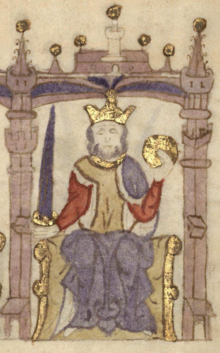Our website is made possible by displaying online advertisements to our visitors.
Please consider supporting us by disabling your ad blocker.
Afonso I of Portugal
This article includes a list of general references, but it lacks sufficient corresponding inline citations. (September 2021) |
You can help expand this article with text translated from the corresponding article in Portuguese. (March 2022) Click [show] for important translation instructions.
|
| Afonso I | |
|---|---|
 Depiction in the Castilian manuscript Compendium of Chronicles of Kings, c. 1312–1325 | |
| King of Portugal | |
| Reign | 26 July 1139 – 6 December 1185 |
| Acclamation | 25 July 1139 |
| Successor | Sancho I |
| Count of Portugal | |
| Reign | 1112 – 25 July 1139 |
| Predecessor | Henry |
| Co-count | Theresa (1112–1128)[1] |
| Regent | Theresa (1112–1128) |
| Born | Alphonso Henryquez[citation needed] 1106, 25 July 1109, August 1109 or 1111 Guimarães (some argue Viseu) |
| Died | 6 December 1185 (aged c. 73–79) Coimbra, Portugal |
| Burial | Santa Cruz Monastery, Coimbra |
| Spouse | |
| Issue Detail | Urraca, Queen of León Teresa, Countess of Flanders Mafalda Sancho I, King of Portugal |
| House | Burgundy |
| Father | Henry, Count of Portugal |
| Mother | Theresa, Countess of Portugal |
Afonso I[a] (Portuguese pronunciation: [ɐˈfõsu]; 1106/1109/1111 – 1185), also called Afonso Henriques, nicknamed the Conqueror (Portuguese: O Conquistador) and the Founder (Portuguese: O Fundador)[2][3] by the Portuguese, was the first king of Portugal. He achieved the independence of the County of Portugal, establishing a new kingdom and doubling its area with the Reconquista, an objective that he pursued until his death.
Afonso was the son of Theresa of León and Henry of Burgundy, rulers of the County of Portugal. Henry died in 1112, leaving Theresa to rule alone. Unhappy with Theresa's romantic relationship with Galician Fernando Pérez de Traba and his political influence, the Portuguese nobility rallied around Afonso, who revolted and defeated his mother at the Battle of São Mamede in 1128 and became sole Count of Portugal soon afterwards. In 1139, Afonso renounced the suzerainty of the Kingdom of León and established the independent Kingdom of Portugal.
Afonso actively campaigned against the Moors in the south. In 1139 he won a decisive victory at the Battle of Ourique, and in 1147 he seized Santarém and Lisbon from the Moors, with help from men on their way to the Holy Land for the Second Crusade. He secured the independence of Portugal following a victory over León at Valdevez and received papal approval through Manifestis Probatum. Afonso died in 1185 and was succeeded by his son, Sancho I.
- ^ Haydn, Joseph (1860). A dictionary of dates relating to all ages and nations: for universal reference; comprehending remarkable occurrences, ancient and modern, the foundation, laws, and governments of countries, ... and particularly of the British Empire. By Joseph Haydn. Edward Moxon, Dover Street. p. 527.
- ^ Congress, Library of. "Afonso I, King of Portugal, 1109?–1185". id.loc.gov. LC Linked Data Service: Authorities and Vocabularies. Retrieved 8 August 2021.
- ^ "Afonso I | king of Portugal". Encyclopedia Britannica. Retrieved 8 August 2021.
Cite error: There are <ref group=lower-alpha> tags or {{efn}} templates on this page, but the references will not show without a {{reflist|group=lower-alpha}} template or {{notelist}} template (see the help page).
Previous Page Next Page


